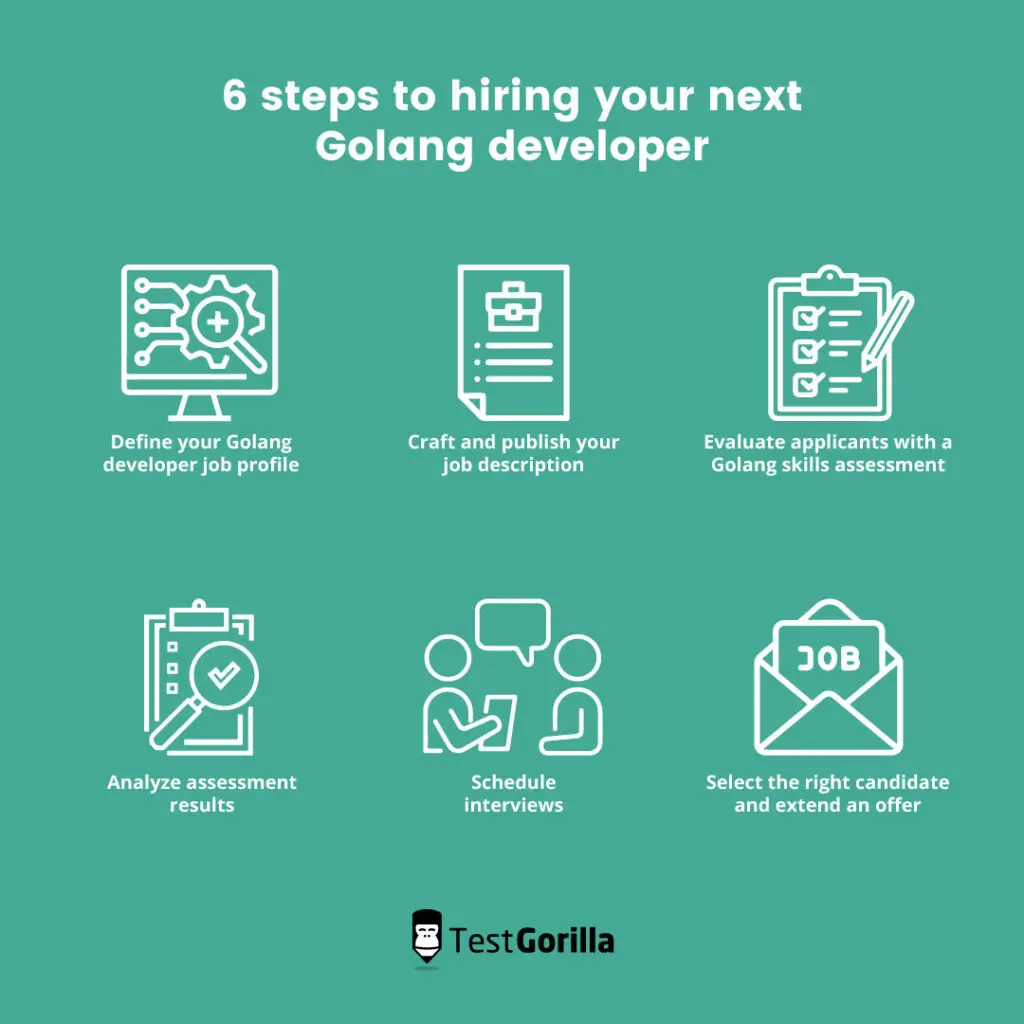If you’re looking to hire Golang developers, you’re not alone.
Golang – also referred to as Go – consistently ranks in the top 10 most loved programming languages by developers. It’s used by companies like PayPal, Meta, Netflix, and Uber.
However, given that Go is a relatively new programming language (it was launched in 2009 as an open-source project), the talent pool of Golang software developers is somewhat smaller than those of other programming languages.
With this in mind, you might be wondering how to hire the best Golang developers for your business.
In this guide, we’ll walk you through everything you need to know – from the top Go developer skills and how to write a great Go developer job description to where to find the best Go developers and how to test candidates’ skills using TestGorilla’s unique test library.
Table of contents
- What is a Golang developer, and what do they do?
- Why should you hire Golang developers?
- Golang developer job responsibilities
- Golang developers’ job requirements and skills
- 10 skills and qualities to look for in Golang developer candidates
- How to create a Golang developer job description
- Where to find Golang developer candidates
- 6 steps to hiring your next Golang developer
- Hire the best Golang developer with TestGorilla’s skills assessments
What is a Golang developer, and what do they do?
Golang developers are programmers and software engineers who create code and maintain applications using the Go language. Like developers who work with other programming languages, they’re responsible for designing, testing, and building programs for operating systems.
They also test and debug code to ensure it works before it’s deployed on the web or mobile devices. Golang developers work with Go’s suite of tools and frameworks.
Golang developers work across many industries. Although Go is a general-purpose language, it’s mainly geared toward server-side (back-end) solution programming. For this reason, a large portion of Go developers work on large-scale projects with complex infrastructure.
Why should you hire Golang developers?
Golang is a highly flexible, cross-platform programming language that can be used for a broad range of web development, back-end development, and mobile apps.
Golang programming is a highly sought-after skill and is valuable for businesses searching for developers to work on large software products.
Here are just a few advantages of hiring skilled Golang developers for your business.
1. Code simplicity
Go does not offer the large feature sets often associated with other programming languages. Plus, Golang operates on a “one problem – one solution” philosophy, which is intended to shorten and simplify problem-solving.
This means that your developers will save time on tasks that typically take longer when using other languages.
2. Concurrency
Golang supports concurrency, which enables programs to run more than one separate process simultaneously. Taking advantage of multiple computer processing cores lets complex programs do multiple things at the same time and benefit from faster processing speeds.
3. Faster development
Golang is a compiled language, which means that code written in Go is converted directly into machine code that processors can understand. The language is also supported by a large standard library of functions, enabling developers to create applications faster than when using other languages such as Java.
Golang developer job responsibilities
A Golang developer’s job responsibilities may differ depending on the project you hire them for.
However, Golang developers often have several job responsibilities that span most industries and projects. These include:
Writing efficient, scalable, and easily maintainable Go code
Planning and tracking development and documenting coding
Identifying and fixing bugs that are found within the code
Maintaining development standards, practices, and procedures
Using various Go frameworks
Planning, designing, and building cloud-based microservices
Collaborating with designers, developers, solution architects, and product managers
Co-ordinating cross-functionally to ensure the project meets business objectives and compliance standards
Participating in code reviews
Golang developers’ job requirements and skills
Again, the job requirements and skills you need to search for will differ depending on the specific project your next Go developer will work on.
When you write your Golang developer job description, you’ll need to carefully consider the project and level of experience the successful candidate will need.
Here are a few standard Golang developer job requirements and skills you can include and change to suit your needs:
More than five years of professional experience in software development using languages such as Go, Java, and Python
Experience designing and developing distributed systems, APIs, workflows, concurrency, multithreading, and synchronization
Knowledge of common Goroutine and channel patterns
Knowledge of Go templating, common frameworks, and tools
Experience with container management and technologies such as Docker and Kubernetes
Experience with relational databases such as SQL
Experience writing highly concurrent code in Golang
Experience developing, designing, implementing, and running microservices in a cloud environment at scale
Strong written, verbal, and interpersonal communication skills
Knowledge of current trends and best practices in software architecture, including performance, accessibility, security, and usability
10 skills and qualities to look for in Golang developer candidates
In addition to technical skills, a great Golang developer also has the necessary soft skills to do their job well and work with a team successfully.
Here, we explore the critical technical and soft skills you need to look for when hiring your next Golang developer.
1. Expertise in Goroutines
Goroutines are functions that enable developers to perform multiple tasks in Go at the same time. This means that tasks can be carried out independently yet simultaneously with other Goroutines in an app or program.
Both junior and senior Go developers should be able to show you their experience with Goroutines.
2. Familiarity with Go channel patterns and frameworks
Go channels enable concurrent Goroutines to communicate and share data. Go developer candidates must be familiar with the different types of Go channels and how to use them to implement frameworks.
3. Expertise in Godoc documentation
Go comes with a built-in documentation tool, Godoc. This tool scans Go source code for comments and automatically collates them to create the package’s documentation.
Go developers must be familiar with the Godoc tool, including formatting rules that enable them to create comments.
4. Proficiency in using Go templates
Go templates enable developers to create dynamic content and customized outputs for different media, including web pages and emails. Your target Go developer should be adept in Go template syntax, parsing templates from files, and implementing templates.
5. Knowledge of versioning tools
A great Go developer has experience using versioning tools such as Git, SVN, and Mercurial. Versioning tools enable developers to revert to earlier versions of the code and work individually using a common codebase.
6. Strong analytical skills
Go developers also need a strong analytical mindset and critical-thinking skills to identify the best way to complete a task or find a solution to a problem. The ability to spot opportunities for improvement and optimization is a valuable asset in any Go developer and benefits teams as a whole.
7. Time management and organizational skills
Time management and organizational skills are powerful capabilities for developers to have since they enable them to track processes and tasks with ease. These skills also help developers to manage backlogs and maintain great version control, which contributes to maintaining high development standards, practices, and procedures.
8. Attention to detail
Because of the complex nature of programming software, Go developers need to have a high level of attention to detail.
The ideal Go developer candidate will be able to show you how they carry out rigorous testing, code reviews, and feature reviews to ensure the code satisfies the requirements and acceptance criteria.
9. Excellent written and verbal communication skills
Using version control systems, creating documentation, and liaising with other developers require both strong written and verbal communication skills.
10. Problem-solving abilities
Golang developers are often tasked with solving complex technical challenges while creating apps and programs. Strong problem-solving skills and agile thinking enable developers to identify effective and efficient solutions to meet the project’s requirements.
How to create a Golang developer job description
Now that you know which skills and qualities to look for in your ideal candidate, it’s time to craft a great Golang developer job description.
Here’s what to include:
A well-defined job title. You’ll need to make it clear whether you’re looking to hire a junior or senior Golang developer to establish the responsibility level and expectations of the role.
Although junior Golang developers should have the experience needed to work on basic projects, senior Golang developers must have specific skills that suit a range of projects with distinct requirements.
A brief overview of your company. A short introduction to your company, including what it does, the sector or industry you work in, and a brief summary of your company culture will help you attract the right candidates for the role.
An overview of the Golang developer role. Provide details about the project the selected candidate will work on, and include your expectations of the role.
Job responsibilities. To avoid unsuitable applicants applying, describe exactly what the role entails.
The skills, experience, and qualifications required for the role. Be clear about the experience and qualifications you’re looking for after taking into account the variety of skills a great Golang developer should have.
Your company’s location and working hours. Indicate clearly whether the role is remote, hybrid, or in person, and include your core working hours.
Information about compensation, perks, and benefits. Transparency around the salary range you can offer will help you attract the right candidates. You should also list any company perks and benefits to help your brand stand out from your competition, such as health insurance, employee referral benefits, or a learning and development budget.
Details about the hiring process. Describe clearly what applicants can expect from your hiring process, including how many interview rounds there will be and whether applicants will be required to take any pre-employment assessments.
For a more in-depth look at how to write a comprehensive job description, you can check out TestGorilla’s guide on how to write great job descriptions. It also contains a useful template.
Where to find Golang developer candidates
Depending on whether you want to hire an in-house or freelance Golang developer, there are several platforms where you can find great candidates. Let’s take a look at some of the most well-known ones:
1. LinkedIn Jobs
LinkedIn is a great place to start your search for your ideal Golang developer. As the world’s largest professional network, it gives you access to the profiles of countless Golang developers across the globe.
The platform’s handy search filters help you to whittle down the results for the best Golang developers, and you can send InMail messages to reach candidates outside your network.
You can also list your Golang developer job opening on LinkedIn, which enables applicants to apply via the platform itself.
2. GitHub
GitHub is the world’s largest software development platform that enables developers to store their code and share it with others for collaboration or further development. With more than 100 million developers using GitHub, you’re sure to find talent that matches your ideal candidate profile.
When you sign up to GitHub, you have access to the platform’s built-in search engine and advanced search options with a broad range of filters. You can search for developers based on their location and the programming languages they use. Many developers have their email addresses listed, so you can contact them directly.
3. Stack Overflow
Stack Overflow is the largest online community where developers can learn and share their knowledge with others.
The platform also has its own job board where you can post your job advertisement and an advanced candidate search function that enables you to find the most relevant candidates in your search to hire a Golang developer.
4. Toptal
Toptal is a platform with a network of top freelance software developers across the world. All applicants to the Toptal network are rigorously tested and vetted before they become potential candidates.
To find a Golang developer with Toptal, you must submit a job description. The platform’s experts then find you the perfect match for the position. Toptal also offers a money-back guarantee if you hire a Go developer via the platform who ends up not being the right fit for your team.
5. Freelancer
Freelancer is a freelance marketplace website where employers post jobs that freelancers then bid to complete. To start hiring a Golang developer this way, you need to fill in a title, job description, and budget. Freelance developers can then submit competitive bids for the job for you to compare.
6 steps to hiring your next Golang developer
Now that we’ve laid out Golang developers’ responsibilities and skills, how to write a job description, and where to find great candidates, it’s time to put all of this information together and start hiring.
Here are six simple steps to hiring a Go developer:
1. Define your Golang developer job profile
Before you write your Golang developer job description, you need to create a job profile.
This will include details about the project that the successful candidate will work on and any specific project areas they will be responsible for. Try to be as precise as possible when creating the profile since Golang developers have different backgrounds and specialized skill sets.
It’s also a good idea to talk to other programmers on your team who will be working with the successful candidate to get their take on what details you should include in the profile.
Based on this information, you’ll be able to define the list of requirements and experience your applicants will need.
Finally, decide on the salary you can offer the successful candidate, including any benefits, bonuses, and perks.
2. Craft and publish your job description
Now that you’ve defined the role, it’s time to create and publish a job description. Remember to include:
A well-defined job title
An overview of the role
An introduction to your company
Details about working conditions
Information about the relevant skills, competencies, and experience you require for the role
Information about compensation, benefits, and perks
Details about the hiring process
Once you’ve put together a job description, you’re ready to publish it. Remember, LinkedIn, GitHub, Toptal, and Stack Overflow are all great places to find and hire a Golang developer.
3. Evaluate applicants with a Golang skills assessment
Once applications start pouring in, you’ll need to begin the process of evaluating the applicants.
However, going through each candidate’s resume with a fine-tooth comb – or even resume screening tools – is a time-consuming process that can also lead to biased and unreliable candidate selection.
That’s why skills-based hiring – which involves defining the specific skills needed for a role and screening candidates based on whether they have those skills – is a much more reliable method of identifying the best Golang developer candidate.
To use skills-based hiring successfully, you’ll need a versatile tool that can help you evaluate a range of skills. With TestGorilla, it’s easy to begin creating skills assessments for your Golang developer candidates to make sure they fit your ideal candidate profile.
How to create a customized Golang developer assessment
TestGorilla offers two pre-designed, role-specific Golang skills tests:
The Go (Coding): Intermediate Problems online test evaluates candidates’ programming skills in Golang. They have 30 minutes to develop a solution to a problem in Go or implement a data structure.
The Go (Coding): Entry-Level Algorithms test evaluates candidates’ basic programming skills by asking them to program a small algorithm in Golang.
Since multi-measure tests have the highest predictive validity among hiring selection practices, TestGorilla also enables you to create an assessment based on your specific business needs.
You can add up to five different tests to an assessment, including other job-related or soft-skills tests, personality tests, cognitive ability tests, and situational judgment tests to help you glean deeper insights and evaluate candidate profiles as a whole.
You also have the choice of adding customized questions to the assessment, assigning points to different questions to better evaluate candidates’ answers, and adding qualifying questions to determine each candidate’s eligibility for the role.
Once you’ve created the assessment, you’ll then invite candidates to complete it through a single or bulk email or through public links that you can add to the job application form. The candidates take the assessment in one sitting, which can be up to 60 minutes long, depending on how many tests you add and how long they take.
4. Analyze assessment results
Once candidates have completed the Golang developer assessment, you can start analyzing the results and deciding who to move forward to the interview stage.
After all of your candidates have completed the assessment, you can immediately identify top performers since all candidates are ranked from high to low based on their average scores.
However, TestGorilla’s analysis also gives you deeper insights into the results as a whole. You can click the names of individual candidates and look closely at all parts of their assessment to see how they scored on specific tests.
Once you’ve examined the results, you can summarize each evaluation by giving each candidate a star rating and recording your own notes. From there, you can start to whittle down the list of candidates you want to move to the interview stage.
5. Schedule interviews
Now that you’ve analyzed the results of the skills assessments and determined which candidates are a good match for your Golang developer role, it’s time to schedule the interviews.
To help you further assess candidates’ knowledge, experience, and skills, here are six Golang developer interview questions you can ask during the interviews.
Can you explain what a Go interface is?
Candidates should be able to explain that since the Go interface is abstract, developers can’t create instances of the Go interface but can create variables of interface types.
Can you define what a workspace is in Go?
Candidates should be aware that workspaces in Go contain Golang code and that they are directory hierarchies with various root directories. They should also be able to describe the three main directories:
The src directory, which features packaged source files
The pkg directory, which contains the package objects
The bin directory, which contains commands that can be run
Can you list the types of operators in Go?
Candidates must be able to list the Go operators:
Arithmetic operators
Misc operators
Assignment operators
Bitwise operators
Relational operators
Logical operators
Can you explain what a dynamic-type variable declaration is in Go?
Golang developer candidates should be able to explain that a dynamic-type variable declaration is used to declare a variable at any point in a Go program.
Can you list the several built-in supports in Go?
Candidates should be able to list the following built-in supports:
Container: container/list, container/heap
Database: database/sql
Cryptography: Crypto/md5, crypto/sha1
Web server: net/http
Compression: compress/gzip
Which soft skills are you working on that can improve your work with Go?
Golang developers need more than technical skills to succeed in their roles.
Candidates should also be able to explain which soft skills – including time management, attention to detail, and communication skills – they are actively trying to develop to help them optimize their use of Go.
6. Select the right candidate and extend an offer
You’re finally ready to choose your successful Golang developer candidate from your list of the top applicants.
When you extend an offer, include compensation and benefits package details, any probationary period information, and the expected start date.
Finally, make sure to provide constructive interview feedback to unsuccessful candidates. This helps provide a good candidate experience and boost your employer branding.
Hire the best Golang developer with TestGorilla’s skills assessments
With such a small pool of Golang developers to hire from, you need to be sure that you’re hiring the best candidate with the right mix of skills and experience.
Without a comprehensive Golang developer assessment that also includes other job-relevant tests, it’s impossible to know whether the skills candidates say they have match their true capabilities. Plus, the results of the assessment help you reach objective conclusions about candidates’ full profiles.
TestGorilla’s Golang developer test helps you quickly identify and hire an excellent Golang developer, avoid costly mis-hires, and reduce your time to hire.
Sign up for TestGorilla’s free plan today, and start using our test library to create a comprehensive skills assessment and find the perfect candidate for your open role.
Related posts
Hire the best candidates with TestGorilla
Create pre-employment assessments in minutes to screen candidates, save time, and hire the best talent.
Latest posts
The best advice in pre-employment testing, in your inbox.
No spam. Unsubscribe at any time.

Hire the best. No bias. No stress.
Our screening tests identify the best candidates and make your hiring decisions faster, easier, and bias-free.
Free resources
This checklist covers key features you should look for when choosing a skills testing platform
This resource will help you develop an onboarding checklist for new hires.
How to assess your candidates' attention to detail.
Learn how to get human resources certified through HRCI or SHRM.
Learn how you can improve the level of talent at your company.
Learn how CapitalT reduced hiring bias with online skills assessments.
Learn how to make the resume process more efficient and more effective.
Improve your hiring strategy with these 7 critical recruitment metrics.
Learn how Sukhi decreased time spent reviewing resumes by 83%!
Hire more efficiently with these hacks that 99% of recruiters aren't using.
Make a business case for diversity and inclusion initiatives with this data.




















